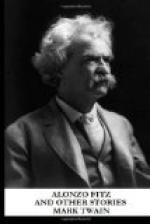They have beans, carrots, turnips, cabbages, and a little maize; pineapples, fig trees, custard-apples, and oranges; lemons, and cocoanuts. Clothing is obtained alone from passing ships, in barter for refreshments. There are no springs on the island, but as it rains generally once a month they have plenty of water, although at times in former years they have suffered from drought. No alcoholic liquors, except for medicinal purposes, are used, and a drunkard is unknown....
The necessary articles required by the islanders are best shown by those we furnished in barter for refreshments: namely, flannel, serge, drill, half-boots, combs, tobacco, and soap. They also stand much in need of maps and slates for their school, and tools of any kind are most acceptable. I caused them to be supplied from the public stores with a Union jack: for display on the arrival of ships, and a pit-saw, of which they were greatly in need. This, I trust, will meet the approval of their lordships. If the munificent people of England were only aware of the wants of this most deserving little colony, they would not long go unsupplied....
Divine service is held every Sunday at 10.30 A.M. and at 3 P.M., in the house built and used by John Adams for that purpose until he died in 1829. It is conducted strictly in accordance with the liturgy of the Church of England, by Mr. Simon Young, their selected pastor, who is much respected. A Bible class is held every Wednesday, when all who conveniently can attend. There is also a general meeting for prayer on the first Friday in every month. Family prayers are said in every house the first thing in the morning and the last thing in the evening, and no food is partaken of without asking God’s blessing before and afterward. Of these islanders’ religious attributes no one can speak without deep respect. A people whose greatest pleasure and privilege is to commune in prayer with their God, and to join in hymns of praise, and who are, moreover, cheerful, diligent, and probably freer from vice than any other community, need no priest among them.
Now I come to a sentence in the admiral’s report which he dropped carelessly from his pen, no doubt, and never gave the matter a second thought. He little imagined what a freight of tragic prophecy it bore! This is the sentence:
One stranger, an American,
has settled on the island—a doubtful
acquisition.
A doubtful acquisition, indeed! Captain Ormsby, in the American ship Hornet, touched at Pitcairn’s nearly four months after the admiral’s visit, and from the facts which he gathered there we now know all about that American. Let us put these facts together in historical form. The American’s name was Butterworth Stavely. As soon as he had become well acquainted with all the people—and this took but a few days, of course —he began to ingratiate himself with them by all the arts he could command. He became exceedingly popular, and much looked up to; for one of the first things he did was to forsake his worldly way of life, and throw all his energies into religion. He was always reading his Bible, or praying, or singing hymns, or asking blessings. In prayer, no one had such “liberty” as he, no one could pray so long or so well.




